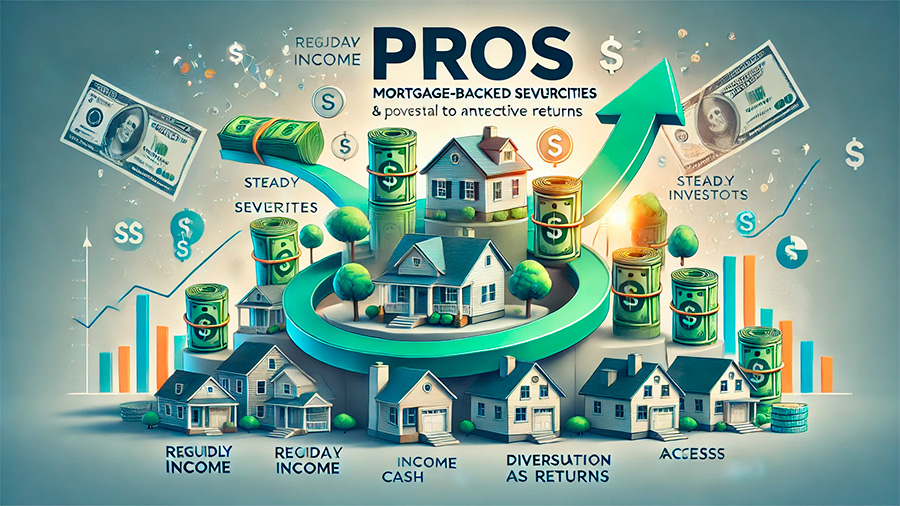
Mortgage-backed securities (MBS) are a type of investment that allows investors to gain exposure to the real estate market without directly owning property. By pooling together a group of mortgages, MBS provide an opportunity for regular income through payments made by homeowners on their loans. While these securities can offer attractive returns, they also carry certain risks that investors need to be aware of.
In this article, we will explore the pros and cons of investing in mortgage-backed securities and help you determine if adding MBS to your portfolio is the right decision.
What Are Mortgage-Backed Securities?
Mortgage-backed securities are bonds that are backed by a pool of home loans. When a bank or lender issues a mortgage, it often sells that loan to government-sponsored enterprises like Fannie Mae, Freddie Mac, or private institutions. These entities bundle together thousands of mortgages to create an MBS, which is then sold to investors. As homeowners make their monthly mortgage payments, those payments (including principal and interest) are passed on to the MBS holders.
MBS offer a way for investors to earn returns based on the mortgage payments made by homeowners, providing a steady income stream. However, this also ties MBS investments to the broader housing market, making them sensitive to changes in interest rates, housing prices, and borrower behavior.

The Pros of Mortgage-Backed Securities
Investing in mortgage-backed securities can offer several advantages, particularly for those seeking income and diversification.
Steady income stream: One of the main attractions of MBS is the regular income they provide. Since they are backed by mortgage payments, investors receive consistent returns as homeowners make their monthly payments. This makes MBS particularly appealing for income-focused investors, such as retirees, who are looking for dependable cash flow.
Diversification: MBS provide a way to diversify your portfolio by gaining exposure to the housing market without owning physical real estate. Because MBS are tied to mortgage loans, they allow investors to benefit from the real estate sector’s performance while avoiding the risks and complexities associated with directly managing properties.
Government backing: Many MBS are issued by government-sponsored entities like Fannie Mae and Freddie Mac, which provide a level of security. These agencies guarantee the mortgage payments, reducing the credit risk for investors. Government-backed MBS are generally seen as lower risk, making them an attractive option for conservative investors.
Potential for higher returns: While MBS are generally considered safer than stocks, they can offer higher yields than other fixed-income investments, such as government bonds. This makes them a popular choice for investors seeking a balance between risk and reward.
Tax Advantages
In addition to providing steady income, certain types of MBS, such as municipal MBS, may offer tax advantages. The interest income from some MBS can be exempt from federal, state, or local taxes, making them more tax-efficient than other income-generating investments. This is especially beneficial for investors in higher tax brackets who want to maximize their after-tax returns.
The Cons of Mortgage-Backed Securities
Despite the benefits, mortgage-backed securities come with significant risks that investors must understand before adding them to their portfolios.
Prepayment risk: One of the biggest risks associated with MBS is prepayment risk. This occurs when homeowners pay off their mortgages early, either by refinancing or selling their homes. When this happens, investors receive their principal back sooner than expected, reducing the amount of interest they would have earned over the life of the loan. Prepayment risk is particularly high during periods of falling interest rates, as more homeowners refinance to take advantage of lower rates.
Interest rate sensitivity: MBS are highly sensitive to changes in interest rates. When interest rates rise, the value of existing MBS tends to fall, as new MBS issued at higher rates become more attractive to investors. This means that if you need to sell your MBS before maturity in a rising rate environment, you could face losses. Additionally, rising rates can reduce the likelihood of prepayments, locking investors into lower yields for longer periods.
Credit risk: Although government-backed MBS are considered safer, private-label MBS (those issued by private institutions) carry credit risk. If the homeowners in the mortgage pool default on their loans, the MBS could lose value, and investors may not receive the expected payments. The 2008 financial crisis highlighted the risks associated with subprime MBS, which played a significant role in the housing market collapse.
Complexity: MBS are more complex than traditional bonds, as their payments depend on the performance of the underlying mortgages. The timing of payments can vary due to prepayments, defaults, or other factors, making it harder for investors to predict cash flows. This complexity can make MBS difficult for individual investors to understand, and it often requires a deeper knowledge of the housing market and mortgage behavior.
Liquidity Concerns
Unlike government bonds, which are widely traded and highly liquid, some types of MBS can be harder to sell on the secondary market. Private-label MBS, in particular, may face liquidity issues, especially during times of market stress. If the housing market declines or economic conditions worsen, it may be difficult to find buyers for your MBS at a reasonable price, potentially leading to losses if you need to sell quickly.

Who Should Invest in Mortgage-Backed Securities?
Mortgage-backed securities can be a good fit for investors seeking steady income and diversification, particularly those with a long-term investment horizon. Conservative investors may prefer government-backed MBS for their relative safety, while those willing to take on more risk might explore private-label MBS for higher potential returns.
However, MBS are best suited for investors who understand the risks involved, including prepayment risk, interest rate sensitivity, and credit risk. Additionally, MBS can play a role in diversifying a portfolio, but they should be balanced with other asset classes to mitigate the impact of interest rate fluctuations and market volatility.
Conclusion
Mortgage-backed securities offer a range of benefits, including steady income, diversification, and potential tax advantages. However, they also come with risks, such as prepayment risk, interest rate sensitivity, and credit risk, that investors need to carefully consider. By understanding the pros and cons of MBS and how they fit into your overall investment strategy, you can make more informed decisions about whether to include them in your portfolio.





